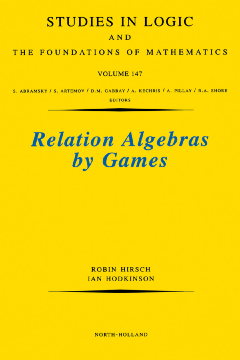
Additional Information
Book Details
Abstract
Relation algebras are algebras arising from the study of binary relations.
They form a part of the field of algebraic logic, and have applications in proof theory, modal logic, and computer science. This research text uses combinatorial games to study the fundamental notion of representations of relation algebras. Games allow an intuitive and appealing approach to the subject, and permit substantial advances to be made. The book contains many new results and proofs not published elsewhere. It should be invaluable to graduate students and researchers interested in relation algebras and games.
After an introduction describing the authors' perspective on the material, the text proper has six parts. The lengthy first part is devoted to background material, including the formal definitions of relation algebras, cylindric algebras, their basic properties, and some connections between them. Examples are given. Part 1 ends with a short survey of other work beyond the scope of the book. In part 2, games are introduced, and used to axiomatise various classes of algebras. Part 3 discusses approximations to representability, using bases, relation algebra reducts, and relativised representations. Part 4 presents some constructions of relation algebras, including Monk algebras and the 'rainbow construction', and uses them to show that various classes of representable algebras are non-finitely axiomatisable or even non-elementary. Part 5 shows that the representability problem for finite relation algebras is undecidable, and then in contrast proves some finite base property results. Part 6 contains a condensed summary of the book, and a list of problems. There are more than 400 exercises.
The book is generally self-contained on relation algebras and on games, and introductory text is scattered throughout. Some familiarity with elementary aspects of first-order logic and set theory is assumed, though many of the definitions are given. Chapter 2 introduces the necessary universal algebra and model theory, and more specific model-theoretic ideas are explained as they arise.
This unique approach to the study of algebraic logic, to a large extent pioneered by the authors, contrasts with the developments based extensively on universal algebra that are found most often in the literature. the book is well written and not only provides a valuable resource to researchers, but is accessible to graduate students and mathematicians in related areas. Extensive intuitive motivation for the techniques and arguments are provided in addition to technical details. Mathematical Reviews This book is a significant advance in the theory of relation algebras. Many of its main results solve difficult and long-standing problems. Its methods, techniques, and constructions are powerful tools for exploring the intricate and varied world of relation algebras. Its many open problems indicate fruitful directions for further research. Logic Journal of the Interest Group in Pure and Applied Logic, Vol. 11, Issue 5, Sept. 2003
"This book is a significant advance in the theory of relation algebras. Many of its main resultssolve difficult an lond-standing problems."
Roger Maddux, (Ames), in: (Zentralblatt für Mathematik, p.4, Vol. 1018, 2004)
"...for Relation Algebras by Games is indeed a source of intellectual delight, treating its topic in a manner befitting its intrinsic charm and beauty."
Maarten Marx, (University of Amsterdam),in: (Studia Logica, Vol. 76, 2004)
